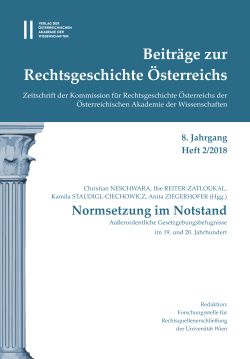
Beiträge zur Rechtsgeschichte Österreichs 2 / 2018, pp. 396-408, 2018/11/28
Normsetzung im Notstand
Außerordentliche Gesetzgebungsbefugnisse im 19. und 20. Jahrhundert
This essay deals with the legal function of enabling acts, such as the enabling act of 1933, which has often been perceived as the central source of legality for the NS regime. However, the history of this specific kind of legislation began earlier, during World War I. From 1914 to 1923, approximately ten of these acts can be identified. Within this period, these acts were not the only means by which the German legislator dealt with states of emergency. However, enabling acts were the only way which permitted the legislators to tackle the problems related to the state of emergency without being bound to the constitutional framework of both the Constitution of the Reich (1871) and the Weimar Republic (1919) respectively. These acts mark fundamental challenges to a constitutional order and mostly transitional periods between political systems: at the end of the monarchy and of the republic.
Keywords: enabling acts–State of emergency–Weimar Constitution